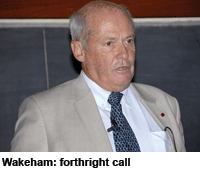To celebrate and commemorate its centenary year, the Indian Institute of Science, Bangalore’s (and India’s) premier research university, has instituted a UK-IISc nationwide lecture series. The lecture series was initiated on the scenic 400-acre IISc campus on August 9 by Sir William Wakeham, fellow of the Royal Academy of Engineering, UK and former vice chancellor of Southampton University. In the inaugural UK-IISc lecture, Wakeham made a forthright call to academics and scientists worldwide to climb out of their ivory towers and collaborate with industry to commerc-ialise research for the benefit of society.
 “Universities cannot work in isolation. They must liaise with industry to apply their research for the service of society. The world over civil society is confro-nted with huge problems which need science and technology solutions. In the UK, universities have fairly successfully adopted an entrepreneurial approach to applying advanced scient-ific research for societal benefit in collaboration with British industry. We hope to share our best practices with Indian universities to ensure that the best of British and Indian science bring real benefits to the people of both coun-tries, and globally,” says Wakeham.
“Universities cannot work in isolation. They must liaise with industry to apply their research for the service of society. The world over civil society is confro-nted with huge problems which need science and technology solutions. In the UK, universities have fairly successfully adopted an entrepreneurial approach to applying advanced scient-ific research for societal benefit in collaboration with British industry. We hope to share our best practices with Indian universities to ensure that the best of British and Indian science bring real benefits to the people of both coun-tries, and globally,” says Wakeham.
Against the backdrop of newly-elected British prime minister David Cameron’s visit to India in end-July during which 17 academic collaboration agreements were signed between British and Indian universities, Prof. Wakeham believes there’s ample scope for research synergies between the two countries particularly in the science and engineering domains. “British uni-versities including Southampton have been successful in commercialising their research with the help of private industry. Commercialisation is no longer anathema to universities in the UK. Now most of them have incubators and science parks within their campuses. Nevertheless some universities are still hesitant about connecting with business and industry. It’s time to break that mindset and cooperate with industry for social benefit,” he says.
An alumnus of Exeter University, Wakeham is a distinguished academic having served with some of UK’s top universities. In 1971, after a postdoctoral sojourn at Brown University, USA, he began his career as lecturer in the chemical engineering department of London’s renowned Imperial College, rising to head of department in 1988. By 1999 he was appointed pro-rector (research and resources) of Imperial and led the college’s merger with a series of medical schools, while stimulating its entrepreneurial activities. In 2001, after more than three decades with Imperial College, Wakeham was appointed vice chancellor of Southampton University, a position he held until September last year.
Currently a fellow of the Royal Academy of Engineering, Institution of Chemical Engineers, and Institute of Physics, Wakeham is a strong advocate of research-led teaching in universities. “Research is essential to faculty delivering contemporary curriculums in classrooms. Unfortunately in India beyond the IITs, there seems to be little research activity in academia. This must change. Innovation should be a major objective of all universities,” he says.
The learned professor’s advice to Indian universities, most of which are mere teaching shops, is to collaborate with the best institutions worldwide to develop faculty and research capabilities. “For Indian higher education, the development prescription is to link up with the best universities of the world, and learn and adopt their best practices in faculty development, research and teaching, and management processes and systems. Given our historical association, most British universities are open to sharing their experience and expertise with Indian institutions,” says Wakeham.
An offer foolish to refuse!
Summiya Yasmeen (Bangalore)